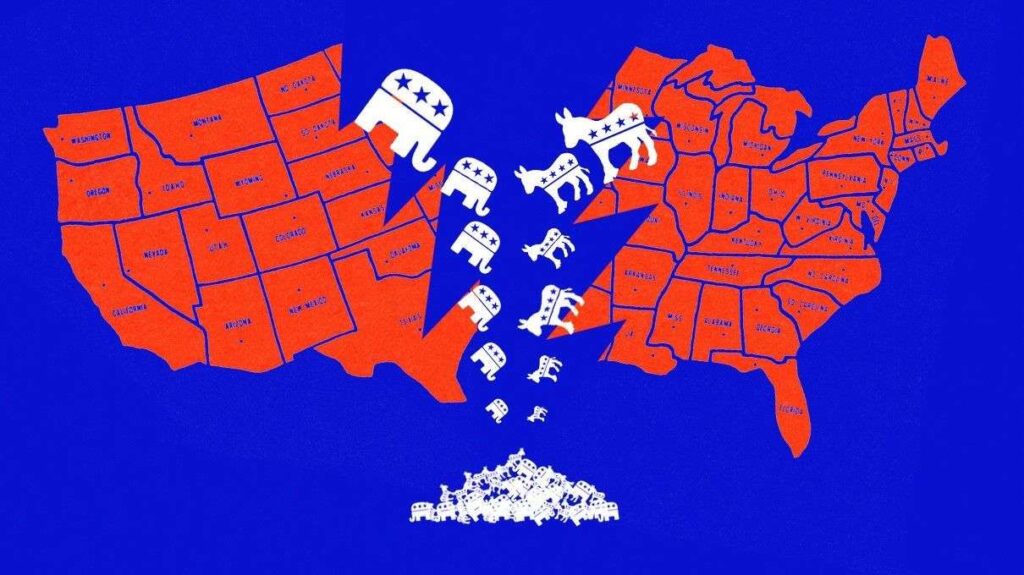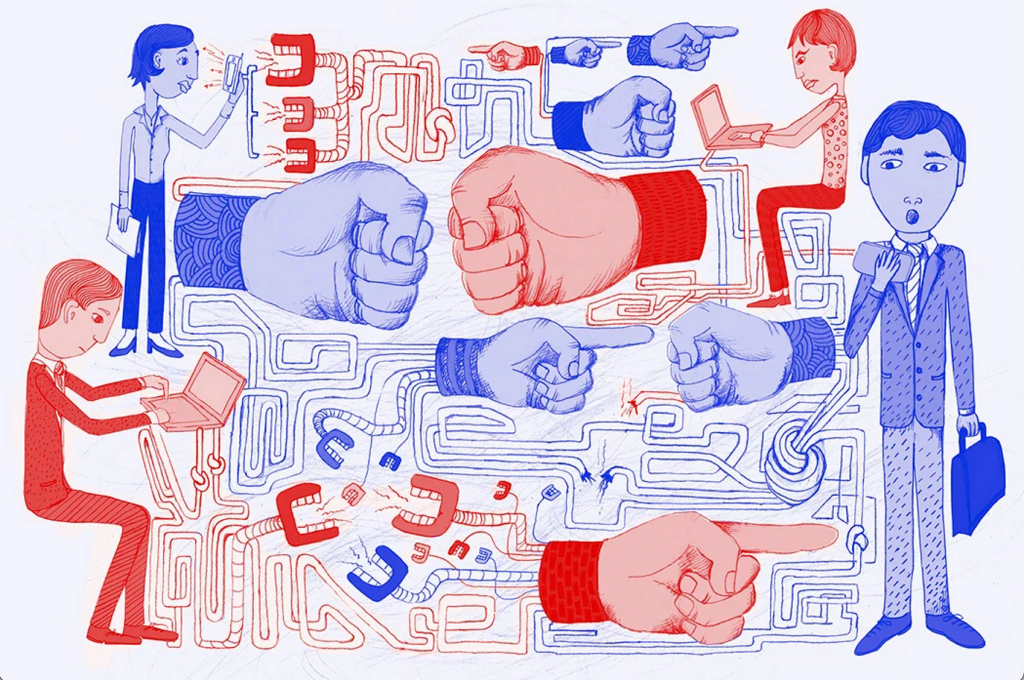Political Polarization
A hallmark of many democracies worldwide, particularly in the twenty-first century, is political polarization, or the widening ideological gap and separation between political parties or groups. The public discourse, policymaking, and governance are all significantly impacted by this tendency. While a robust political discourse is necessary for a democracy to function, excessive polarization can worsen societal tensions, cause deadlock, and undermine democratic institutions.
This article examines the origins, expressions, and effects of political polarization in diverse political systems in order to better understand how it is influencing policy. It also examines the solutions that individuals, legislators, and civil society might provide to the problems brought about by growing polarization.

The Roots of Political Polarization
Although political polarization is not a recent phenomena, a number of reasons have contributed to its intensification in recent decades. To fully appreciate the influence of polarization on policy, one must comprehend its historical roots.

1. Realignment of Ideologies
Political parties have experienced a substantial ideological realignment in numerous nations, most notably the US. Parties that were formerly broad alliances of many interests have become more homogeneous in their ideologies over time. For example, in the United States, the Republican Party has drifted to the right, notably on immigration, gun rights, and deregulation, while the Democratic Party has moved further to the left on topics like social justice and climate change.
Since their policy stances on important topics have sharply varied, the two major parties have found it more difficult to establish common ground as a result of this realignment. As a result, reaching a compromise—a prerequisite for good policymaking—has grown more challenging.
2. Inequality in the Economy and Society
Growing inequality has exacerbated divisions along socioeconomic and cultural lines, which has led to political polarization. Many people feel marginalized and disenchanted with the political system as a result of economic disruption, especially in industrialized nations. Populist movements that oppose established political elites and support measures that address the complaints of working-class voters have grown in strength as a result of this unhappiness.
For instance, in Europe, the perceived loss of national sovereignty and hostility to immigration have played a role in the growth of right-wing populist parties. Similar dynamics have been seen in the United States with the growth of movements such as the Tea Party and the election of Donald Trump, whose anti-establishment rhetoric appealed to voters who felt left behind by economic change and globalization.
3. The Information and Media Environment
The spread of social media, digital media, and 24-hour news cycles has been a major factor in the intensification of political division. Traditional media sources used to serve as gatekeepers, giving the public access to a common set of information and stories. However, a lot of individuals today receive news and information that is specific to their political convictions, which frequently serves to strengthen already held opinions and widen differences.
Conspiracy theories and false information have gained more traction as a result of the emergence of so-called “echo chambers,” places where people are largely exposed to viewpoints that concur with their own. Political discourse has become even more divisive as a result, with people dismissing objective facts that contradict their ideas and growing mistrust of those who hold opposite viewpoints.
4. Politics of Culture and Identity
Polarization has also been exacerbated by identity politics, which is the practice of supporting laws based on one’s gender, color, sexual orientation, religion, or other facets of one’s personal identity. Identity politics has given excluded groups more clout in their demands for recognition and equal rights, but it has also stoked cultural conflicts in many cultures.
Debates in the United States about immigration, gender identity, and race relations have grown extremely divisive, with both sides blaming the other of endangering their principles and way of life. Discussions centered on policy or the economy are sometimes overshadowed by these cultural differences, which makes reaching a consensus and a compromise much more difficult.
Manifestations of Polarization in Policy
Policymaking is impacted by political polarization in a number of ways, including deadlock, intense partisanship, and frequently bad governance. There are a number of detrimental effects that arise from parties’ diminished capacity to collaborate on significant reforms when their ideological differences widen.
1. Gridlock in policy
Policy deadlock, in which disagreements between parties on important issues force the legislative process to come to a complete standstill, is one of the most obvious consequences of political polarization. Legislatures have a hard time reaching a consensus because compromise is frequently viewed as a betrayal of fundamental values in highly polarized political systems.
For instance, even though it is widely acknowledged that policy solutions are required, Congress in the United States has had difficulty passing comprehensive legislation on gun control, healthcare, and immigration reform. Similar to this, in the European Union, differences in opinion among member states about matters such as climate policy and refugee resettlement have resulted in accords that are weaker or nonexistent.
In addition to impeding the adoption of new laws, gridlock makes it more difficult for governments to respond to pressing issues like natural disasters, economic crises, and public health emergencies.
2. Extremism in Policy
Political parties and candidates are motivated to appease their base by taking more extreme stances as polarization grows, as opposed to pursuing moderate or centrist ideas. This tendency is especially noticeable in primary elections, when contenders vying for the party’s candidacy must win over the most ideologically driven supporters.
This trend toward extreme policymaking may lead to poorly thought out or challenging to execute policies in addition to dividing society. For example, radical stances on immigration that don’t address the fundamental difficulties of immigration reform may mobilize a political base but don’t address requests for border barriers or mass deportations. Similarly, broad proposals to severely restrict industry or remove government programs may encounter strong opposition, rendering them unfeasible in the long run.
3. Prompt Policy Development
Parties that are more polarized tend to prioritize short-term electoral advantages above long-term solutions when formulating policies. Deep political divisions mean that parties would rather invest in substantial reforms that take time to bear fruit than in initiatives that will win over new followers in the next election cycle.
For instance, people may support tax cuts or stimulus packages that offer temporary economic assistance, but they may not address structural problems like income inequality or long-term budgetary sustainability. In a similar vein, policies implemented in response to disasters such as mass shootings or terrorism may prioritize punitive measures above proactive initiatives that necessitate bipartisan cooperation.
4. Destroying Democratic Norms
Moreover, democratic institutions and norms can be undermined by extreme polarization. To further their policy objectives in intensely divided situations, political actors may turn to undermining democratic processes including free press, judicial independence, and fair elections.
Politicians occasionally try to silence dissenting voices in the media, cast doubt on the validity of elections, and undermine the independence of the court. These deeds have the potential to erode public confidence in democratic institutions and fuel the rise of authoritarianism. The consequences of polarization and the partisan manipulation of democratic norms have led to democratic backsliding in a number of nations, including Venezuela, Hungary, and Turkey.
Addressing Political Polarization
Although political polarization poses a great deal of difficulties, its effects on governance and policymaking can be lessened. Reforming political structures, encouraging civic involvement, and encouraging communication across ideological divisions are some of these tactics.
1. Reforms to Institutions and Elections
By promoting more moderate candidates and offering incentives for cooperation, electoral system reforms can aid in the reduction of polarization. For instance, ranked-choice voting, which lets voters arrange candidates according to their preferences, might encourage the formation of agreement and lessen the impact of extreme candidates.
Reforms pertaining to primary election systems, redistricting procedures, and campaign finance rules can also aid in lessening the disproportionate impact of money and party interests in politics. These adjustments may lead to more competitive elections and motivate decision-makers to seek for common ground instead of pandering to their own ideological constituencies.
2. Encouraging Public Participation
To combat polarization, civic involvement and political participation are crucial. Engaging citizens in public life increases the likelihood that they will demand policies that benefit the general welfare and hold politicians responsible.
Ideological differences can also be bridged through promoting communication and cooperation amongst those who hold different opinions. Initiatives that support community involvement, civic education, and interpartisan dialogue help lessen the demonization of political opponents and increase tolerance for a wider range of viewpoints.
3. Improving Media Knowledge
Promoting media literacy and critical thinking abilities is crucial as the media landscape gets more fragmented. In addition to seeking out a variety of trustworthy information sources, citizens must be able to identify bias and false information. Programs for media literacy, implemented in public campaigns and in schools, can lessen the impact of party echo chambers and promote better educated voters.
4. Promoting Interparty Cooperation
Bipartisan cooperation may become more challenging as a result of polarization, but it is not impossible. Politicians should give priority to matters like infrastructure, education, and criminal justice reform where there is a chance for bipartisan cooperation. These sectors present chances for agreement and can support the restoration of public confidence in the democratic system.
Building bridges between politicians from opposing parties can also aid in removing polarization’s hurdles. Initiatives that foster communication and collaboration include the bipartisan Congressional retreats held in the United States, where legislators from both parties convene to discuss policy in a more relaxed atmosphere.
Conclusion
Political polarization is having a significant impact on policy, changing everything from the effectiveness of legislation to the standard of democratic governance. Although polarization is a normal aspect of politics, the degree to which it is occurring now poses a threat to democratic institutions and prevents wise policy from being made. Reforming political institutions, reviving civic involvement, and attempting to heal ideological rifts will all be necessary to meet this challenge. Finding common ground in an era of growing polarization is not only possible, but also essential to ensuring that democratic institutions continue to work well in the face of changing international issues.










Leave a Reply